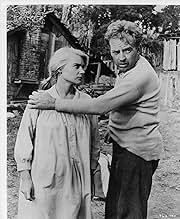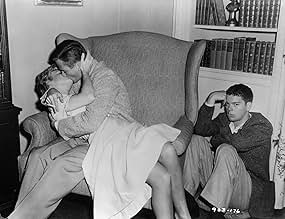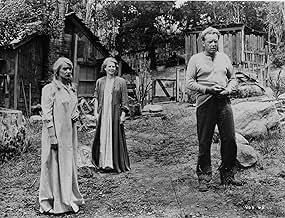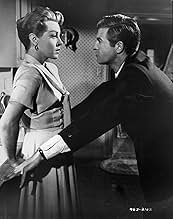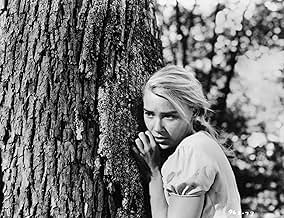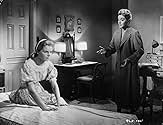VALUTAZIONE IMDb
7,2/10
7019
LA TUA VALUTAZIONE
Una tranquilla cittadina del New England nasconde segreti e scandali.Una tranquilla cittadina del New England nasconde segreti e scandali.Una tranquilla cittadina del New England nasconde segreti e scandali.
- Candidato a 9 Oscar
- 2 vittorie e 17 candidature totali
Recensioni in evidenza
Grace Metalious' bestseller comes to the screen with lavish good taste, but the small town scandals depicted are not entirely white-washed. Glossy melodrama directed by Mark Robson allows star Lana Turner to suffer nobly, playing single mother to graduating teenager Diane Varsi, harboring a skeleton in her family closet while being romanced by high school principal Lee Philips (in an appealing performance). Varsi and her friends are all awakening to the joys of boy-girl coupling, unsure about sex and not about to ask their parents for help. Involving and polished, though just a bit stiff or starchy. The courtroom climax (with shopgirl Hope Lange on trial for killing her abusive step-father) is really corny, but fans of the soap genre will be enthralled. Fashioned into a popular television serial starting in 1964. Followed by "Return to Peyton Place" in 1961, which featured none of the talents assembled here. *** from ****
10nowlang
Peyton Place is a great and realistic observation of human behavior taken in the context of when and where it was written, no matter how shocking truth may appear. After years of medical practice, I have lived many experiences not unlike that of Dr. Swain in this novel/movie. I saw "Peyton Place" for the first time in my late forties as part of a CineClub presentation. I grew up naively in a small North East farm town in the late 50's. My grand uncle was our local Country Doctor. I was frightened if not scandalized by the big city lifestyle when I moved to the city to attend medical school. He assured me that "we" had the same "scandals" in our community, it was just "hidden or kept secret". In all honesty, I had already witnessed some of these issues as they shook my own family of origin. Later, I returned to practice in a rural town. As I got closer to the native citizens, I discovered many secrets, secrets not unlike some of the tragic events that took Peyton Place by storm. As I grew older (and hopefully wiser), I realized that each town has their own "Peyton Place". It's all around us, it's is part of our human nature, part of it is in each one of us. Mrs. Metalious, the author of this great novel, paid the price of her own honesty with her life. This novel and the movie that it is based on, have to be taken in the time context it was created. Unfortunately, many of these events are still taking place around us today. I have witnessed them through my interaction with many patients and friends. Love, lust, passion, ambition, greed, envy... are all basic instincts that drive us through the meanders of life, some leading us to good outcomes others to tragedy. I recently returned from our occupation in Iraq where I was severely injured in combat, ending my career as a physician. I saw the best and also the worst of what man can do to mankind. I witnessed many issues that I saw in Peyton Place, only on a larger scale. Peyton Place bears witness to a part of the world we live in, it is in all of us. The events taking place in her youth were the source of Grace Metalious' novel and shaped the course of her story. I highly recommend this movie, it is part of history, our American history, good or bad. Finally, I greatly appreciate all the viewers that take time to share their opinion about movies with the readers through IMDb's Comments Place. May God or your "Higher Power" bless you all, GLN.
Okay, so I wasn't alive in the 50s. But my father certainly was.
He recommended this movie to me, and I have to say -- I was impressed.
It represents one of the few mainstream films of the era that presented day-to-day life as it really was. Peyton Place is a movie that strips away the candy-coated exterior which surrounds many a 50s film, and shows the raw and flawed lives of people who are struggling with issues that viewers in today's society can still relate to.
Although a different genre, it wasn't until I delved deeper into Film Noir that I discovered more films that presented an edgier and raw window into the world of the 40s and 50s. I appreciate a writer or director that has the guts to risk losing viewers by insisting on honest presentation of culture or events.
This film is worth a look.
He recommended this movie to me, and I have to say -- I was impressed.
It represents one of the few mainstream films of the era that presented day-to-day life as it really was. Peyton Place is a movie that strips away the candy-coated exterior which surrounds many a 50s film, and shows the raw and flawed lives of people who are struggling with issues that viewers in today's society can still relate to.
Although a different genre, it wasn't until I delved deeper into Film Noir that I discovered more films that presented an edgier and raw window into the world of the 40s and 50s. I appreciate a writer or director that has the guts to risk losing viewers by insisting on honest presentation of culture or events.
This film is worth a look.
10acukurin
A sheer number of society issues this film covered is staggering, and it was done in warm and kind way, with great scenario and good performances from the actors. The only sad thing is that most of the themes they covered are still taboo and unresolved in 2020. Really enjoyable film, glad I had the chance to watch it!
The Hollywood melodrama is a magical thing. You could fixate on one for a century, devouring its unrealistic rosiness and torrid, intermingling plot lines. Some directors (William Wyler, Edmund Goulding) are able to nourish them, managing to turn camp into something classier than overwrought trash. But then there are others (Douglas Sirk, Billy Wilder) who can see the fun in the fluff, commenting on the usual inauthenticity while still making a top-notch product.
Peyton Place is the granddaddy of all Hollywood melodramas, not quite self-referential but not quite forgettable. It's just right. At nearly three hours, it is everything Days of Our Lives and The Bold and the Beautiful ever wanted to be. It has only three moods: romantic, stormily melodramatic, or vanilla, like Leave It to Beaver. These moods never mix together with continuity — there only seems to be room for the loudest of colors, shades and subtleties burnt to a crisp. Scenes are designed with the dramatized emphasis of a fashion magazine photoshoot, practically screaming that, yes, the film has a big-budget, and yes, it can afford to be filmed in CinemaScope.
Peyton Place isn't a smart melodrama cut from the same cloth as Written on the Wind, but thanks to shows like Twin Peaks, vintage soap has been given an entirely new edge. Instead of watching one for its unfiltered clutter, there seems to be a satirical acidity at play, even if it isn't on purpose. Landscape shots have the phony cheerfulness of a tempting postcard. Neighborhoods are decked out with white-picket fences, green grass, sunny skies, and clean-cut youths. Everything is too immaculate. You can sense that there is a lot of drama going on behind closed doors.
To explain the piling of story lines would be like patting my head and rubbing my stomach while typing; they have the same complexities as a family tree of socialites. All I will say is that Lana Turner is named Constance McKenzie (a name that was perhaps chosen by a soap opera character generator), and she, along with her daughter (Diane Varsi), acquaintances, and old-time friends, live in Peyton Place, an idyllic town stationed in rural New England. Gossip travels faster than a speeding bullet, romances begin as often as babies are born, and a scandal can destroy a person's life with more pain than a knife to the chest. I may enjoy watching tragedy happen to other people, but is it wrong to say that I would not be opposed to living in a town this exciting?
In Peyton Place, a blistery kiss or a b*tch slap to a well-endowed mug become the equivalents of a fiery explosion. It is hammier than Bette Davis eating a ham sandwich with Joan Crawford and Miriam Hopkins. There is plenty to stare at and gasp at and cry at and emote at, however ridiculous. We know that it's bad for us, but it is impossible not to consume something that wraps us up in a tweed suit and transports us into a parallel universe of cracked perfection. The youths, no matter how flawless they first appear, are either loose cannons on full throttle or suppressed lightweights waiting to blow up. The passive aggressive judgment of Peyton Place eventually sets their path and decides if they will be the talk-of-the-town for the rest of their life or the neighbor you beam at when you pass them at the grocery store.
Fittingly, the film became a hit not for its merit, not for its acting, not for its artistic capabilities, but because of a scandal possibly too jaw-dropping for the confines of Peyton Place. Long story short: At the time, Lana Turner was dating Mickey Cohen's right-hand man. One night, he flew into a rage, and, in response, her daughter came to her defense, stabbing him to death. Peyton Place had been out for months, making little money, but once the nonstop headlines began, it became the second highest grossing movie of 1958. Looking back, the Turner ordeal was and still is the kind of sh*t America feeds on with a frenzy. No one wants to admit that they enjoy some garbage here and there, but I'm sure the majority of InTouch readers indulge themselves not because they find value in celebrity gossip but because they find all the melodramatic lies to be a h*ll of a lot more entertaining than the intellect of Vanity Fair. As far as publicity goes, Peyton Place got its sharing served on a silver platter. What better suits faux soap than real soap?
Even with the unforgiving attention surrounding her, Turner has certainly never been better. Throughout the 1940s, she was mostly placed into the shoes of the sexy love interest, sometimes a femme fatale and sometimes the sweet girl you can't wait to go home to after fighting overseas. In Peyton Place, she is appealingly breathy, always ready with cocked eyebrow, perpetually p*ssed off at how her messy past affects her currently dusty one. She blows cigarette smoke as if she's late for an upcoming confrontation with an old mistake. Turner carries the weight of the film on her shoulders, working as its emotional core and its best actor. Some could declare her work as pure overacting, but on Peyton Place's terms, she comes out a champion. Few can say that murder lead to their career resurgence, but Turner is more than able.
One could accuse Peyton Place of being too preachy to be completely successful, but its influence is undeniable. It propelled the careers of talented young actors (Russ Tamblyn, Hope Lange), and lead to a popular TV spin-off in the 1960s, setting the standard for modern soap operas. As a standalone film, it works as a well-made, wildly entertaining soaper. The two-hours and 37 minutes go by with lightning speed; one could say that the film is too short, a good sign if there ever was one.
Peyton Place is the granddaddy of all Hollywood melodramas, not quite self-referential but not quite forgettable. It's just right. At nearly three hours, it is everything Days of Our Lives and The Bold and the Beautiful ever wanted to be. It has only three moods: romantic, stormily melodramatic, or vanilla, like Leave It to Beaver. These moods never mix together with continuity — there only seems to be room for the loudest of colors, shades and subtleties burnt to a crisp. Scenes are designed with the dramatized emphasis of a fashion magazine photoshoot, practically screaming that, yes, the film has a big-budget, and yes, it can afford to be filmed in CinemaScope.
Peyton Place isn't a smart melodrama cut from the same cloth as Written on the Wind, but thanks to shows like Twin Peaks, vintage soap has been given an entirely new edge. Instead of watching one for its unfiltered clutter, there seems to be a satirical acidity at play, even if it isn't on purpose. Landscape shots have the phony cheerfulness of a tempting postcard. Neighborhoods are decked out with white-picket fences, green grass, sunny skies, and clean-cut youths. Everything is too immaculate. You can sense that there is a lot of drama going on behind closed doors.
To explain the piling of story lines would be like patting my head and rubbing my stomach while typing; they have the same complexities as a family tree of socialites. All I will say is that Lana Turner is named Constance McKenzie (a name that was perhaps chosen by a soap opera character generator), and she, along with her daughter (Diane Varsi), acquaintances, and old-time friends, live in Peyton Place, an idyllic town stationed in rural New England. Gossip travels faster than a speeding bullet, romances begin as often as babies are born, and a scandal can destroy a person's life with more pain than a knife to the chest. I may enjoy watching tragedy happen to other people, but is it wrong to say that I would not be opposed to living in a town this exciting?
In Peyton Place, a blistery kiss or a b*tch slap to a well-endowed mug become the equivalents of a fiery explosion. It is hammier than Bette Davis eating a ham sandwich with Joan Crawford and Miriam Hopkins. There is plenty to stare at and gasp at and cry at and emote at, however ridiculous. We know that it's bad for us, but it is impossible not to consume something that wraps us up in a tweed suit and transports us into a parallel universe of cracked perfection. The youths, no matter how flawless they first appear, are either loose cannons on full throttle or suppressed lightweights waiting to blow up. The passive aggressive judgment of Peyton Place eventually sets their path and decides if they will be the talk-of-the-town for the rest of their life or the neighbor you beam at when you pass them at the grocery store.
Fittingly, the film became a hit not for its merit, not for its acting, not for its artistic capabilities, but because of a scandal possibly too jaw-dropping for the confines of Peyton Place. Long story short: At the time, Lana Turner was dating Mickey Cohen's right-hand man. One night, he flew into a rage, and, in response, her daughter came to her defense, stabbing him to death. Peyton Place had been out for months, making little money, but once the nonstop headlines began, it became the second highest grossing movie of 1958. Looking back, the Turner ordeal was and still is the kind of sh*t America feeds on with a frenzy. No one wants to admit that they enjoy some garbage here and there, but I'm sure the majority of InTouch readers indulge themselves not because they find value in celebrity gossip but because they find all the melodramatic lies to be a h*ll of a lot more entertaining than the intellect of Vanity Fair. As far as publicity goes, Peyton Place got its sharing served on a silver platter. What better suits faux soap than real soap?
Even with the unforgiving attention surrounding her, Turner has certainly never been better. Throughout the 1940s, she was mostly placed into the shoes of the sexy love interest, sometimes a femme fatale and sometimes the sweet girl you can't wait to go home to after fighting overseas. In Peyton Place, she is appealingly breathy, always ready with cocked eyebrow, perpetually p*ssed off at how her messy past affects her currently dusty one. She blows cigarette smoke as if she's late for an upcoming confrontation with an old mistake. Turner carries the weight of the film on her shoulders, working as its emotional core and its best actor. Some could declare her work as pure overacting, but on Peyton Place's terms, she comes out a champion. Few can say that murder lead to their career resurgence, but Turner is more than able.
One could accuse Peyton Place of being too preachy to be completely successful, but its influence is undeniable. It propelled the careers of talented young actors (Russ Tamblyn, Hope Lange), and lead to a popular TV spin-off in the 1960s, setting the standard for modern soap operas. As a standalone film, it works as a well-made, wildly entertaining soaper. The two-hours and 37 minutes go by with lightning speed; one could say that the film is too short, a good sign if there ever was one.
Lo sapevi?
- QuizSome of the shots of the New England fall were shot for La congiura degli innocenti (1955).
- BlooperAll of the women's hair styles and clothing are strictly 1957, not 1941.
- Citazioni
Mr. Harrington: This job starts at 3,000 a year.
Michael Rossi: Then we're all wasting our time. That's only $5 a week more than I was making as a teacher, Mr. Harrington
Mr. Harrington: But this offers you security -- a long term contract.
Michael Rossi: Guaranteed poverty is not security.
- Versioni alternative(Spoiler) Originally premiered at 162 minutes. Cut by 5 minutes, shortly after premiere, reputedly in the scene involving the murder of Arthur Kennedy's character.
- ConnessioniFeatured in 20th Century-Fox: The First 50 Years (1997)
- Colonne sonoreWonderful Season of Love (Theme from Peyton Place)
(uncredited)
Music by Franz Waxman
Lyrics by Paul Francis Webster
[Sung by chorus over closing credits]
I più visti
Accedi per valutare e creare un elenco di titoli salvati per ottenere consigli personalizzati
- How long is Peyton Place?Powered by Alexa
Dettagli
- Data di uscita
- Paese di origine
- Sito ufficiale
- Lingua
- Celebre anche come
- Peyton Place
- Luoghi delle riprese
- Camden, Maine, Stati Uniti(Exterior)
- Aziende produttrici
- Vedi altri crediti dell’azienda su IMDbPro
Botteghino
- Lordo Stati Uniti e Canada
- 25.600.000 USD
- Tempo di esecuzione2 ore 37 minuti
- Colore
- Proporzioni
- 2.35 : 1
Contribuisci a questa pagina
Suggerisci una modifica o aggiungi i contenuti mancanti


